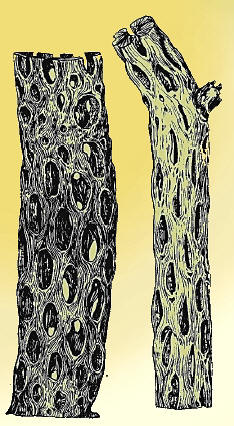 |
The
cell wall in plants is a
rigid, strong and more or less
flexible
structure located outside
the plasma membrane
of most plant cells. It is
primarily made of structural
carbohydrates such as
cellulose.
Cell wall provide
mechanical support. They often contain secondary
metabolites,
suberin or
lignin. In
particular the supportive function is acted by specialized
thick walled cell (e.g.
tracheids, fibre cells,
sclereids etc.) localized
in many tissues (e.g.
xylem) and forming the
various organ of plants (e.g.
stems,
roots and
leaves).
In most vascular plants
the stem is the major
aerial
support
structure, it holds up
the plant into the air against
gravity and provides a
pathway for fluid transport
between the shoot and the
root. Roots instead provide
the unseen underground
support system, both
structurally, anchoring
the plant to prevent it falling, and by
absorbing
nutrients and
moisture from the
soil which are
transported through the
trunk and into the
crown. The support in both
aerial and
underground part of
plants is furnished by the
cell walls:
Left: Cylindropuntia
timber a supporting
structure formed by
lignified
vascular bundles (primary
xylem) |